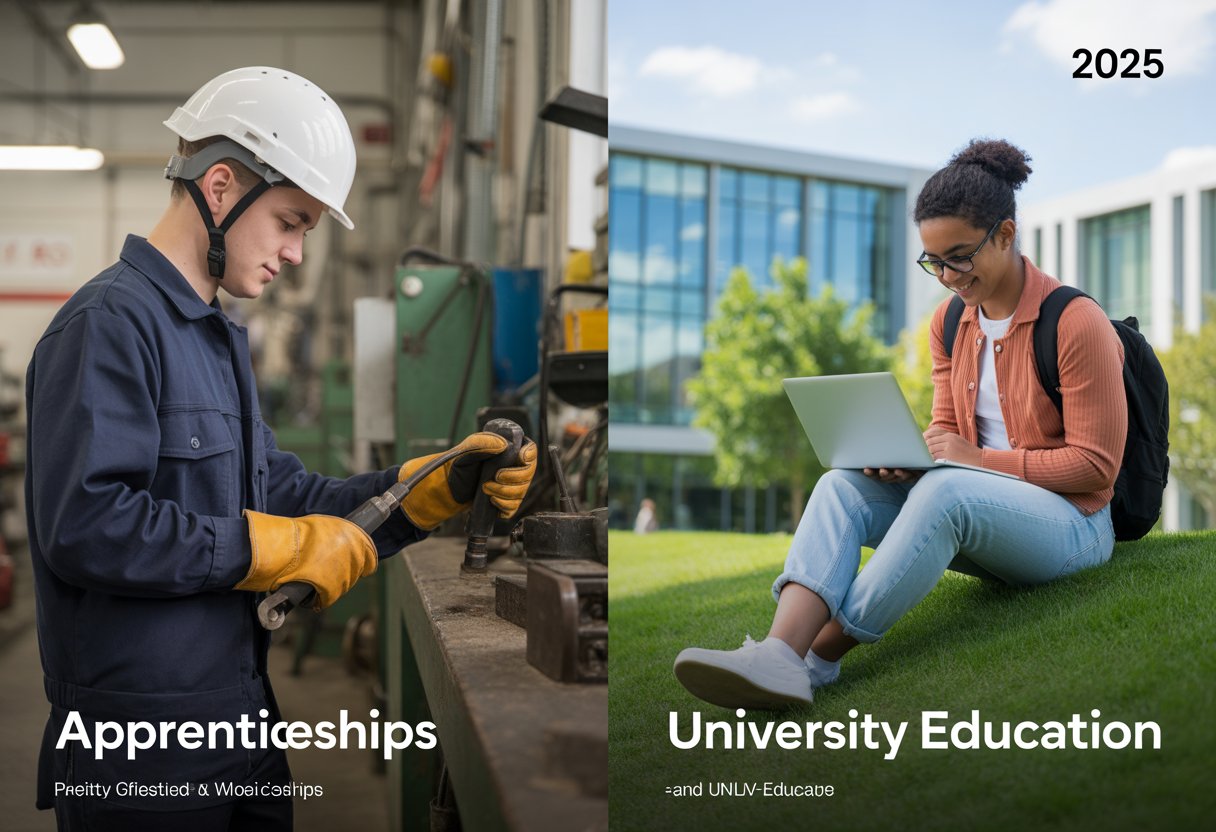In 2025, choosing between apprenticeships and university depends on what someone wants to achieve in their career. Both paths offer valuable skills, but they lead to different experiences and outcomes. Apprenticeships provide hands-on training and often faster entry into the workforce, while university focuses more on theory and broader education.

For many, the decision comes down to their learning style, financial situation, and long-term goals. Apprenticeships can be a smart option for those who prefer practical work and earning while they learn. University may suit those aiming for careers requiring deep academic knowledge or licences.
Understanding these differences helps people make informed choices that best fit their future. This article looks at what makes sense for individuals in 2025, breaking down the key points clearly.
Understanding Apprenticeships in 2025

Apprenticeships combine practical work experience with some classroom learning. They offer a way to gain skills while earning money in real job settings. This section looks at what apprenticeships involve, the popular jobs filled this way, and how to apply.
Definition and Structure
An apprenticeship in 2025 is a paid job that mixes hands-on work and formal study. It usually lasts between one and four years, depending on the industry. Apprentices split their time between the workplace and a college or training centre.
The training is designed to meet industry standards. Apprentices earn a recognised qualification at the end, such as a diploma or degree equivalent. Employers often provide mentorship and support during the apprenticeship.
Popular Industries and Roles
Apprenticeships are common in sectors like construction, engineering, healthcare, information technology, and finance. For example, in construction, apprentices might train as electricians or plumbers. In IT, roles include software developers or network technicians.
Some newer areas also use apprenticeships, such as renewable energy and digital marketing. These industries value skilled workers who learn on the job. Apprenticeships are increasingly seen as a route to skilled, well-paid roles.
Entry Requirements and Application Process
Most apprenticeships require GCSEs (or equivalent) in English and maths. Some higher-level apprenticeships might ask for A-levels or prior relevant experience. Age limits can vary, but many are open to people aged 16 and over.
Applications are usually made directly to employers or through government portals. The process involves submitting a CV, attending interviews, and sometimes completing an assessment. Unlike university, apprenticeships focus more on practical ability than academic grades.
Overview of University Education in 2025

University education in 2025 offers a wide range of degree types, entry requirements, and popular subjects. Students need to understand what academic options are available, how to apply, and which courses attract the most enrolment.
Academic Pathways and Degrees
Universities provide multiple academic routes including bachelor’s, master’s, and doctoral degrees. Most students start with a three- or four-year bachelor’s degree.
There are also foundation and diploma courses designed for those who need extra support before a full degree. Degree apprenticeships have grown, combining work experience with part-time study.
Online and hybrid learning remain common, allowing flexible study options. Some programmes focus on practical skills, while others stress academic research.
University Entry Criteria
Entry requirements often include A-level results or equivalent qualifications like BTECs. Specific grades or subjects may be required depending on the course.
Many universities use the UCAS points system to compare applicants. Some courses, like medicine or law, require additional exams or interviews.
Personal statements and references are important for showing motivation and suitability. Increasingly, universities consider extracurricular activities and work experience.
International students must meet English language standards and provide academic transcripts recognised in the UK.
Popular Courses and Fields of Study
Business, health sciences, and computer science are among the most popular undergraduate courses in 2025. These areas reflect job market demands and technological growth.
Creative industries, such as media and design, also attract many students. Traditional fields like engineering, education, and law remain strong choices.
There is growing interest in environmental science and sustainability as students respond to global challenges. STEM subjects continue to receive significant investment.
Many courses now include practical placements or projects to improve employability after graduation.
Comparing Career Prospects and Job Market Outcomes

Choosing between apprenticeships and university impacts job availability, salary growth, skill sets, and promotion chances. These factors vary depending on the industry and individual goals. Understanding how each path affects these outcomes helps people make clear decisions.
Graduate Employability Rates
University graduates usually have higher initial employability rates in fields like law, medicine, and engineering. Many employers prefer a degree as a minimum requirement. However, apprentices often secure jobs quickly within skilled trades and technical roles, where practical experience counts more.
Employability for apprentices tends to be strong in industries such as construction, manufacturing, and IT support. Some companies actively seek apprentices to fill specific roles. Employment rates for university graduates can vary significantly by subject, with STEM degrees often leading to better prospects.
Earning Potential Over Time
University graduates often start with higher salaries, especially in professions like finance, healthcare, and technology. Over 10 to 15 years, earnings can increase significantly, particularly if they gain postgraduate qualifications or enter management.
Apprentices usually begin with lower pay but often avoid student debt. Skilled tradespeople may see faster wage growth early on. For example, experienced electricians or plumbers can earn salaries comparable to some degree holders after several years.
Skill Development and Transferability
Degrees focus on academic knowledge, critical thinking, and research skills. These skills are often transferable across industries, especially for general subjects like business or IT. Graduates may need additional training for practical job tasks.
Apprenticeships provide hands-on experience and industry-specific skills. These skills are usually less transferable outside their trade but are highly valued within it. Apprentices learn through real work situations, improving problem-solving and technical abilities directly applicable to their roles.
Opportunities for Advancement
University education can open doors to higher-level roles and leadership positions. Many companies require degrees for promotions beyond entry-level jobs. Higher education also offers networking opportunities that may boost career growth.
Advancement for apprentices depends on the sector. Some trades offer clear pathways to senior technician, supervisor, or business owner roles. Career progression can be rapid in growing industries but may plateau without further qualifications. Continuous professional development is often necessary to progress.
Cost, Funding, and Financial Considerations

The costs of apprenticeships and university differ greatly. Apprenticeships usually have lower upfront fees but vary in other expenses. University expenses often include high tuition fees and living costs. Funding options also differ, with grants, loans, and employer support playing key roles.
Tuition Fees and Training Costs
University tuition fees in the UK can range from £9,250 to £27,000 per year, depending on the course and institution. Many students take out government-backed loans to cover these fees, which must be repaid after graduation.
Apprenticeships generally have no direct fees for the learner. Employers or the government usually cover the costs of training. Some higher-level apprenticeships may charge small fees, but these are much lower than university tuition.
Training costs for apprenticeships include on-the-job learning and sometimes classroom time. These costs are mostly absorbed by the employer or funded through apprenticeship levy schemes.
Living Expenses and Student Debt
University students often face significant living costs for housing, food, and travel. The average yearly living cost is about £12,000, which can add to the total financial burden.
This often leads to students taking on debt, which can take years to repay. The average student loan debt in the UK is around £45,000.
Apprentices earn a wage while training, which helps cover living costs. They usually avoid the high levels of debt common with university graduates because their training is paid.
Available Grants and Financial Support
Universities offer various grants and bursaries based on need or academic merit. Students may also access student loans and scholarships for specialised subjects.
Apprentices may be eligible for financial support such as travel allowances or equipment grants. Some sectors provide extra funding to encourage apprenticeships in shortage occupations.
Employers might offer additional bonuses or benefits, reducing apprentices’ overall expenses. Government programmes continue to expand financial support for both paths, but availability depends on location and sector.
Work-Life Experience and Personal Development
Choosing between apprenticeships and university affects practical skills, social life, and career connections. Each path shapes personal growth and opportunities in distinct ways.
On-the-Job Learning Versus Academic Study
Apprenticeships offer direct experience in a real work environment. Individuals learn practical skills daily and apply knowledge immediately. This hands-on approach often leads to quicker proficiency in a specific trade or role.
University study focuses on theory, research, and broad knowledge. Students spend more time in lectures and studying. This method helps deepen understanding but may delay hands-on practice.
Apprentices often earn a salary while training, which can reduce financial stress. University students usually pay fees and may work part-time, potentially dividing focus between study and job.
Building Professional Networks
Apprentices build contacts within their industry from day one. They meet colleagues, clients, and managers regularly, which can open up job offers and mentoring. These networks often lead directly to future employment.
University students meet peers from diverse fields and backgrounds. This diversity can foster a wider range of connections, including academic professionals and industry guest speakers. However, links to specific workplaces may be less immediate.
Both routes require effort to maintain and grow professional connections. Apprentices may develop more job-specific networks, while university graduates often access broader, more varied contacts.
Student Life and Extracurricular Opportunities
University provides a rich social environment with clubs, societies, and events. These activities help develop leadership, teamwork, and communication skills outside the classroom.
Apprentices have less free time for social clubs due to work commitments. Their social interactions are usually tied to the workplace or local community. This may limit certain personal development activities.
Both experiences contribute to personal growth but differ in setting and focus. University life often builds broader soft skills, while apprenticeships strengthen work-related character and discipline.
Choosing the Right Path in 2025
Deciding between apprenticeships and university depends on clear goals, market demands, and support from trusted advisers. Knowing personal interests, future job trends, and who can offer sound advice will guide this choice.
Assessing Individual Goals and Aspirations
He or she should start by identifying what they want from a career, such as job satisfaction, income, or job security. Apprenticeships suit those who prefer learning practical skills on the job. University might fit better for those drawn to academic or research roles.
Reflecting on one’s strengths is important. Some find hands-on work more rewarding, while others enjoy studying theory. Time commitment also matters—apprenticeships often last 1-3 years, whereas degrees usually take 3-4 years.
Financial situation is a factor too. Apprentices earn while they learn, which helps avoid student debt. University students may face higher upfront costs but could gain more in long-term earning potential in some fields.
Industry Trends and Future Opportunities
Job markets in 2025 are shifting. Growing sectors like technology, healthcare, and green energy offer both university and apprenticeship routes. For example, tech apprenticeships in coding and cybersecurity are expanding rapidly.
Higher education remains crucial for careers needing specialised knowledge, such as medicine or engineering. However, many trades like electricians, plumbers, and digital marketers rely heavily on apprenticeships.
Table of Examples:
| Sector | Best Route | Notes |
|---|---|---|
| Engineering | University | Requires degree licences |
| Digital Marketing | Apprenticeship | Combines work and study |
| Healthcare | University | Long degrees with practical parts |
| Construction | Apprenticeship | Hands-on skill focus |
Job security and future demand should weigh heavily in the decision.
Guidance for Parents and Career Advisers
Parents and advisers should encourage young people to explore their interests without bias. Understanding the pros and cons of both paths can prevent pressure towards university when an apprenticeship may be better.
They must provide updated information on earning, career growth, and job satisfaction. Real examples from industry can help young people make informed decisions.
Advisers should highlight the importance of soft skills like communication and adaptability. Both paths require work ethic and lifelong learning.
Supporting questions might include:
- What excites you about a future job?
- How do you learn best: by doing or studying?
- What lifestyle do you want?
Clear, honest conversations lead to better career choices.

